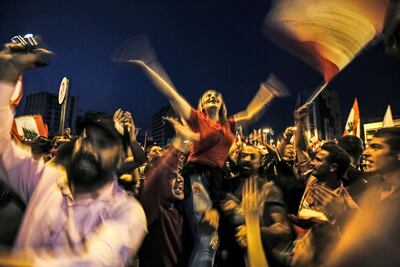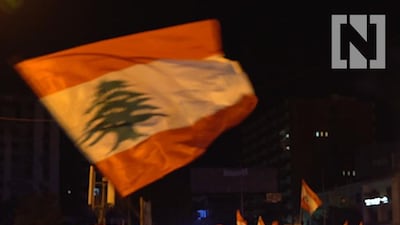Standing under a ripped picture of Prime Minister Saad Hariri, Omar Ahlab was selling coffee to Tripoli’s protestors on Tuesday night.
Tens of thousands gathered in festive anti-government protest for the sixth consecutive day.
In Tripoli, all respect for the Prime Minister, who is also the leader of Lebanon’s Sunni community, is gone. The “capital of the North” is the country’s second-biggest city and has a sizable Sunni majority.
“Hariri said he would fix the country, but he destroyed everything,” complained Mr Ahlab. “We want all politicians to go.”
Still discernible at the bottom of Mr Hariri’s poster was the sentence “we are all with you”.
This was printed on thousands of pictures all over the country as a gesture of support to the Prime Minister when he made a surprise resignation in November 2017, before rescinding it.
When Mr Hariri formed his cabinet earlier this year, after nine months of political infighting, he vowed to “work, work, work,” to implement much-needed economic reforms. But the Lebanese are disappointed with the apparent lack of result.
“We do not want Hariri, [President Michel] Aoun, or [Hezbollah leader Hassan] Nasrallah. Excuse my language, but they are all dogs. Dogs. Dogs,” repeated 50-year old carpenter, Ahmad al Amouri, who attended the protests with his family. “Before, in the north, people liked Hariri, but now nobody wants him anymore, whatever he does.”
A father of six children, Mr Al Amouri said he struggles to pay his monthly $400 rent. “There is no work and no money in Tripoli. Politicians buy votes with $50. This is an indication of how hungry our people are.”

Like many other protestors, Mr Al Amouri said he wanted the government to resign and be replaced by “technocrats”.
“I want a new government that looks after people who are dying of hunger,” he said, raising his voice to be heard above the music, chanting and fireworks.
Local media reported on Wednesday that politicians have been discussing a cabinet reshuffle or the resignation of the government.
“You can see from their decisions that they are scared and do not know what to do. Yesterday, the education minister announced that universities would open on Wednesday, before backtracking half an hour later,” said a demonstrator who wished to remain anonymous because his employer asked him not to speak to the media.
Commercial activity had ground to a halt in Lebanon on Tuesday as roads, banks, shops and universities remained closed. The drive from Beirut to Tripoli, which normally takes a little over an hour, took four hours because of roadblocks.
Protestors said they had grown tired of politicians’ promises and stand united in their rejection of the ruling elite that has governed the country since the end of the civil war in 1990.
____________
Lebanese army clears streets as politicians talk resignations
____________
The figure of 80,000 protestors on Tuesday night in Tripoli was widely relayed among locals, though no official figures have been released.
Lebanese media previously reported that posters of several politicians had been taken down last week in Tripoli, including ex-prime minister and millionaire Najib Mikati.
A local ex-MP was attacked on Friday when he tried to join protests. His security guards opened fire, wounding four people.
Amal El Jamal, a 38-year old teacher who was out protesting on Tuesday evening, said she was not surprised that politician’s posters had been ripped down.
“We were promised many things, and nothing happened. We do not have electricity, water or social security,” she said. “You cannot blame people who hung the posters in the first place, they are poor and need [political support] to put their kids in schools and hospitals. But it is our right also to not have posters of politicians up.”
Other protestors nuanced their criticism of Mr Hariri, but none said they would vote for him.
“His father [Rafiq Hariri], may his soul rest in peace, did a lot. But in my opinion, Saad Hariri is not a politician. He was a businessman, and they told him that because he is Sunni Muslim he must be like his father and replace him,” said 35-year old English teacher Maya Fawad.
The younger Hariri succeeded to his father after the former prime minister was assassinated in 2005. Fingers pointed to Damascus, which had occupied Lebanon for 29 years, prompting massive protests that pushed Syrian troops out of the country.
Though many have compared the current uprising to the 2005 events, protestors in Tripoli said that this time, they are more significant.
“In 2005, the Lebanese protested for sheikh Rafiq Hariri. Now, all the Lebanese are doing this for themselves, for our passport, for our future, for our kids,” said 25-year old photographer Omar El Imady, standing on a rooftop overlooking the protests in Al Nour square.
Facing him, some activists were drawing a giant Lebanese flag on an eight-floor building, under which they had written in red and white, the country’s colours: “Thanks to the army, the security forces and Tripoli’s municipality. Tripoli is the city of freedom and coexistence. The people’s revolution.”
Mr El Imady said he felt immense pride in the positive image that the protests have brought to Tripoli.
“This is really great. It’s the real image of Tripolitans. Tripoli has been known as ‘Kandahar city’, and now it is showing it is peaceful. They are shouting in one voice and one heart.”
In June, Tripoli witnessed its worst terrorist attack in years, when a man with previous links to ISIS threw grenades and opened fire on the police and army, killing two policemen and two soldiers.
In recent years, it has been rocked by communal violence linked to the Syrian conflict.
Residents complain about lack of investment in the city’s infrastructure, army brutality and a slow judicial system.













